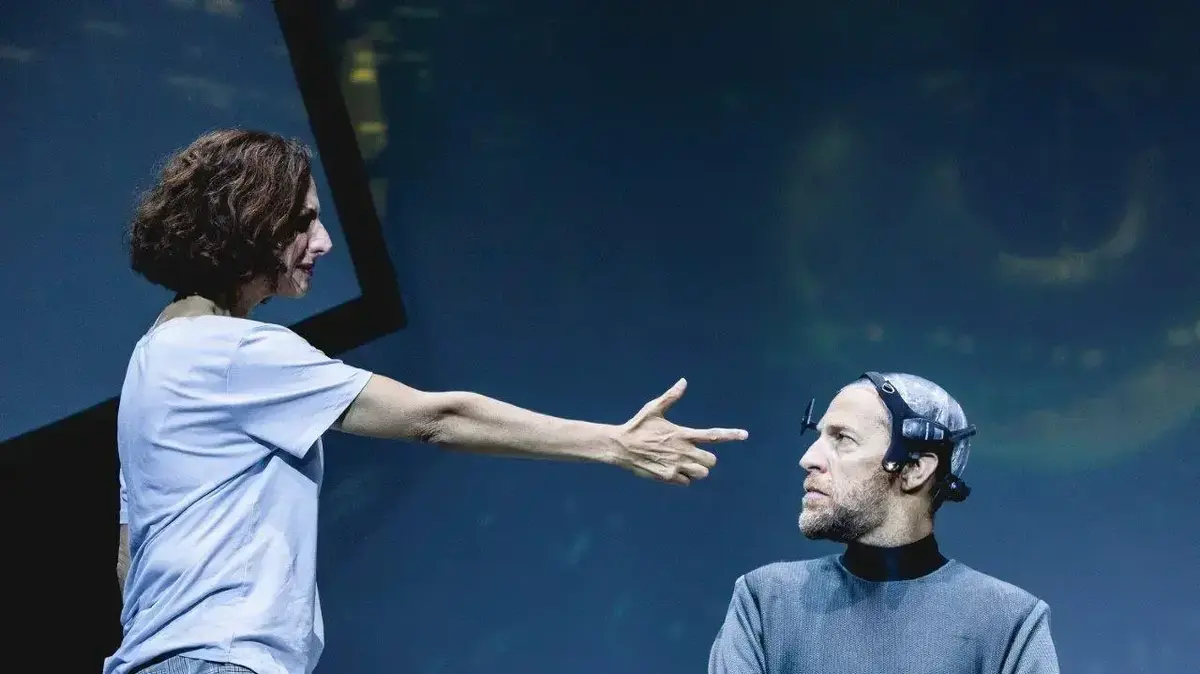This show describes the triumph of artificial intelligence.
It's hard not to come out of it terrified
"(R)evolution", Gesher Theater's show inspired by the writings of Yuval Noah Harari, attempts to comically show how the technology of the future will reduce human autonomy, and the heavy price of being enslaved to it.
Despite the good intentions, she is not interesting or funny enough, and has trouble rising above banality
Nadav Menuhin
10/19/2022
Wednesday, October 19, 2022, 00:00
Share on Facebook
Share on WhatsApp
Share on Twitter
Share by email
Share in general
Comments
Comments
Precisely when she is not trying to be funny, she manages to touch the viewers.
From the play "(R)Evolution" (Photo: Isaiah Feinberg)
A couple who is asked to choose which child they want to bring into the world using editing and genetic engineering tools, at a high price and with impossible dilemmas, while their "smart" home appliances impose a healthy lifestyle on them and act as they wish;
A lonely woman whose close-knit AI-based electronic assistant predicts her mother's death, lures her into purchasing a program that will turn him into something simulating a partner, and finally informs the police about her random offhand comment that was taken out of context and supposedly made her a potential security threat, and therefore sure;
And a doctor who needs his artificial assistant to tell him what he wants to eat and conduct revealing couples therapy for him and his partner, who only has sex with him in a video game, based on her access to all their information and his analysis.
These are the ingredients that make up "(R)Evolution", the clever name of a new show at the Gesher Theater, which is avowedly based on the writings of the historian Yuval Noah Harari ("A Brief History of Mankind").
It is signed by well-known and respected theater people: the director is veteran Ilan Ronen and the playwrights are his daughter, Yael Ronen, and a German actor named Dimitri Schad.
Five actors play all the roles in the play: Alon Friedman, Gilad Lecter, Ruth Rasiuk, Ido Mosari and Michal Weinberg.
A terrifying future.
From the play "(R)Evolution" (Photo: Isaiah Feinberg)
The show focuses on some specific elements of Harari's perception of the future of humanity, such as his predictions regarding the takeover of technology over man, the victory of homo-sapiens over biology and at the same time their loss as a biological species, and the price of this transformation.
I will say for the sake of full disclosure that I have a superficial acquaintance with Harari, but in any case, with all due respect, he is not what we are dealing with here, and the link to him is excessively loose: artificial intelligence and its war on humans is such a central key issue in science fiction in recent decades, and it is equally possible It could be argued that this is a show inspired by "2001: A Space Odyssey", "Upgraded Carbon", "The Matrix" or "Blade Runner", even if the domestication of the wheat somehow got into the show.
If we do go back to Harari, one of the most significant things in my view that he points out is the fact that even though these dramatic upheavals may be around the corner, not too many decades away, there is almost no public or ethical discussion of any kind about them - except in literature and art.
Humanity is busying itself with temporary political issues, and putting aside the meanings of this revolution.
The future will be eaten for the sake of the present, and without us noticing we will find that resource-rich technology corporations will already make the decision for us.
In this sense, "(re)evolution" does do an important job, bringing up for discussion descriptions of everyday decisions in such a future age, where having children goes through genetic engineering related to economic decisions, privacy does not exist, and statistical probability replaces all other logic.
It's hard not to leave this show terrified, even though it is ultimately a comedy.
More in Walla!
It starts like any happy time at the beach.
Little by little it was revealed how terrible the disaster was
To the full article
It is difficult to describe the plot of the play, because the connection between the sequence of images is ultimately very loose and the connection between the episodes is random, it is also ultimately about recurring characters.
In each of the scenes, one of the heroes confronts the close-knit artificial intelligence, and discovers how his independent existence as a self-sovereign person is diminishing, as it were, in the name of the general good, determined by computers.
The show opens with a rather vulgar monologue, in which one of the actors (Alon Friedman) explains that supposedly as part of a digitization project, the seats in the hall will be monitored in order to gather information and understand what biological reactions the show evokes in real time, alluding to the audience's sexual attraction to the actors.
Later we meet the five heroes, whose relationship is random as mentioned, when they face the above questions.
Despite the inherent promise of dealing with such issues, "(R)Evolution" is not an artistically impressive show.
Most of the descriptions are indeed comical, but the show is not really funny, although there are some good jokes here and there.
Even the scenarios at its center are ultimately quite banal, predictable and repetitive, like some kind of skits that would have been better cut at an earlier stage.
Of the three main episodes - the couple struggling with whether and how to have children and struggling with the electrical appliances (Ruth Rasiuk and Ido Mosari), the confused doctor and his relationship with his partner (Gilad Kalter and Alon Friedman), and the lonely woman and her artificial lover (Michal Weinberg and Gilad Kalter) - the latter is the only one that manages to cross From the level of the sketch to an interesting, even touching drama.
This is an episode that examines, among other things, the reduction of emotion in such a world, the consequences of the climate crisis, the collapse of the political and economic order in its wake, and especially dystopian supervision, reminiscent of both historical and fictional dictatorships.
Precisely here, when the play does not try to force a laugh but emphasizes human loneliness in such a world, it manages to touch the viewers.
Not going far enough.
From the play "(R)Evolution" (Photo: Isaiah Feinberg)
The stage design is pretty thin in itself.
Three screens accompany the plot, and apart from them it is worth noting only the clothing of the artificial intelligences - whose name is Elekto or Elekta, depending on the species: a species of blue suits and gloves and an electronic device near the eyes.
As with other aspects of the play, it seems that here too they did not go far enough to take the play forward.
It turns out that "(R)Evolution" may bring interesting ideas to the viewers, but despite the good intentions - as a show it is mediocre and disappointing.
The road to awakening humanity from its slumber is still long.
culture
in what
theater
Tags
Yuval Noah Harari
Gesher Theatre







/cloudfront-eu-central-1.images.arcpublishing.com/prisa/OHXLFBWROJHYTONFRSHBKYUOIU.jpg)







